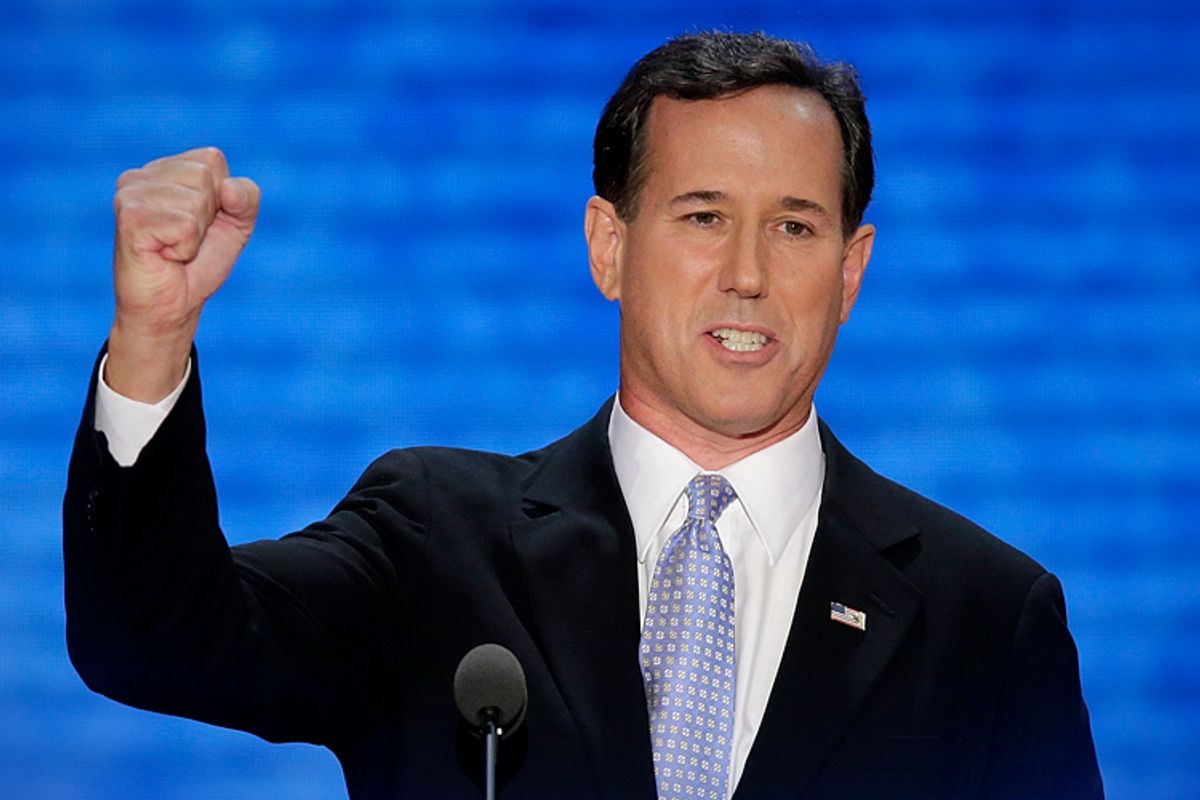There's an idea in conservative politics that Republicans should bury efforts to reform the immigration system and redouble its efforts to shore up support among white working voters. Normally the word "white" is silent in this formulation, but it doesn't really need to be said.
For the most part, though, Republican opponents of immigration reform don't have anything new to offer the white working class, other than an argument that they are more unyielding in their conservatism than most.
Enter Rick Santorum, the GOP's Great White Hope.
If Ted Cruz is the reactionary face of the modern GOP then Santorum is at least cognizant of working people's troubles (see here why the word "white" goes unsaid). But he also exemplifies why the nascent whites-only strategy is doomed to failure.
In an interview with the Washington Examiner's Byron York, Santorum -- who's headed to Iowa this week! -- established his role in the field of Republican 2016 hopefuls.
"[W]e tend not to see the folks who are behind the counter or on the factory line or in the wash room as heroes, even though they built it too," he said. "People have got to believe you care … you’d be amazed how much people think you care if you talk about them and about what their concerns are and about the problems that they’re having.”
This is a common conservative trap of prioritizing messaging over substance. As the old saying goes, "Give me a living wage and some sympathetic rhetoric, and I'll have a living wage."
Santorum was a presidential candidate just over a year ago. You don't have to go back far at all to get a sense of how his working-class sympathies translate into policy. Almost across the board, Santorum was indistinguishable from his opponents, all of whom ran on radical platforms. Repeal Obamacare? Check! Slash social spending? Check! Privatize Medicare and devolve Medicaid to the states? Check! Draconian border policy? Check! A constitutional balanced budget amendment? Check! Reduce Social Security cost of living adjustments and increase the retirement age? Check! Deregulate Wall Street? Check! Further weaken unions? Check!
The one place he distinguished himself from the rest of the pack was tax policy. Whereas other leading candidate plans would have increased the tax burden on low- and middle-income earners -- or at best done nothing for them -- Santorum's plan would have reduced it. But not nearly as much as it would have reduced the tax burden on very wealthy people -- an odd priority for a champion of the working class. Santorum's real claim to fame -- and surely this would distinguish him from Ted Cruz and Rand Paul -- was being slightly less plutocratic than his peers.
This is where the great conservative dilemma becomes Santorum's personal contradiction. You can't be a conservative in good standing without proposing huge, regressive tax cuts, but you can't be a working-class tribune unless you propose to do more than toss scraps to struggling people after ravaging their safety net.
(This is to say nothing of the energizing effect Santorum's retrogressive sexual politics, and propensity to put his foot in his mouth -- see: blah people -- would have on Democratic voters.)
A handful of conservative intellectuals have recognized the contradiction, and proposed that Republicans broaden their appeal beyond white voters -- not by reflexively passing immigration reform but by jettisoning the axiom that downward redistribution is per se immoral. That would be great! But it's purely academic if it's not a viable Republican primary platform. And Santorum's last candidacy suggests the best one can do on this score is talk a good game.

Shares